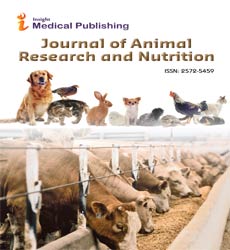Types of Animal Food Supplementation and Nutritional Needs for Animals
Abdulrahman Napathorn*
Department of Animal Science, hn???r??? Teknologi Malaysia, Skudai, Malaysia
Abdulrahman Napathorn*
Department of Animal Science, Universiti Teknologi Malaysia, Skudai, Malaysia
- *Corresponding Author:
- Abdulrahman Napathorn
Department of Animal Science,
Universiti Teknologi Malaysia, Skudai,
Malaysia,
E-mail: Napathorn_a@gmail.com
Received date: November 07, 2023, Manuscript No. IPJARN-24-18424; Editor assigned date: November 10, 2023, PreQC No. IPJARN-24-18424 (PQ); Reviewed date: November 24, 2023, QC No. IPJARN-24-18424; Revised date: December 01, 2023, Manuscript No. IPJARN-24-18424 (R); Published date: December 07, 2023, DOI: 10.36648/2572-5459.8.6.105
Citation: Napathorn A (2023) Types of Animal Food Supplementation and Nutritional Needs for Animals. J Anim Res Nutr Vol. 8 No.6: 105.
Abstract
Description
Animal food supplementation, also known as dietary supplementation, is a practice that involves providing additional nutrients to animals beyond what is naturally available in their regular diet. This strategy aims to address specific nutritional deficiencies, enhance performance, support growth, and optimize overall health. Whether in the context of livestock farming, pet care, or wildlife conservation, animal food supplementation plays a crucial role in ensuring that animals receive the essential nutrients they need for proper development and well-being.
Nutritional Needs of Animals
Animals, like humans, require a balance of macronutrients (carbohydrates, proteins, and fats) and micronutrients (vitamins and minerals) for optimal health. The specific nutritional requirements vary among species, age groups and physiological states such as gestation or lactation. Certain amino acids and fatty acids are deemed essential because animals cannot synthesize them in sufficient quantities. These must be obtained through the diet. Providing these essential building blocks is critical for processes such as protein synthesis and maintaining cellular structure.
Advancements in technology and data analytics have enabled precision supplementation, allowing farmers and caregivers to tailor nutrient intake based on individual animal needs. This approach optimizes resource use and minimizes waste. Nutrigenomics explores the interaction between nutrition and genetics. Understanding how an animal's genetic makeup influences its response to specific nutrients can lead to personalized supplementation strategies for improved health and performance. The development of functional foods, which inherently contain beneficial nutrients or additives, represents a future direction in animal food supplementation. These foods go beyond basic nutrition, offering specific health benefits to animals. Sustainable supplementation practices, emphasizing locally sourced and eco-friendly supplements, will likely become more prominent. This aligns with broader efforts in agriculture to reduce environmental impact and promote sustainable practices.
Animal food supplementation emerges as a versatile and indispensable tool in ensuring the nutritional well-being of animals across various contexts; including livestock farming, pet care and wildlife conservation. As our understanding of animal nutrition deepens and technological innovations continue to unfold, the future of supplementation holds promise for more targeted, sustainable and personalized approaches. Striking a balance between meeting the diverse nutritional needs of animals and addressing ethical and environmental concerns will be pivotal in shaping the trajectory of animal food supplementation in the years to come.
Types of Animal Food Supplementation
Mineral and vitamin supplements are commonly used to address deficiencies in the diet. For example, calcium and phosphorus supplements may be provided to support bone health in livestock, while vitamin supplements can enhance immune function and prevent deficiency-related diseases. Protein is a vital component of animal diets, especially for those undergoing rapid growth or high-performance activities. Protein supplements, often derived from sources like soybean meal or fish meal, can be added to the diet to ensure adequate protein intake. Animals with high energy requirements, such as working animals or those in intense production phases, may benefit from energy supplements. These supplements often include concentrated sources of carbohydrates or fats to boost energy levels.
Functional feed additives encompass a diverse range of substances added to animal diets to improve performance, health, or feed efficiency. Examples include probiotics, prebiotics, enzymes and growth promoters, each serving a specific purpose in enhancing animal nutrition and well-being. Livestock raised for meat production may be supplemented with growth promoters to enhance muscle development and overall growth. These may include hormones, such as growth hormone or steroids, which stimulate protein synthesis and muscle growth. Trace minerals, such as selenium, copper and zinc, are crucial for various physiological functions in livestock. Deficiencies can lead to health issues and reduced productivity. Supplementation ensures that these minerals are available in appropriate amounts.
In regions where forage availability varies with the seasons, farmers may use seasonal supplementation to address nutrient gaps. For example, during the dry season, when forage quality may be lower, animals might receive additional feed to meet their nutritional needs. Pets, such as dogs and cats, may require specialized diets based on factors like breed, age and health conditions. Veterinary-prescribed supplements may include joint supplements for older pets or omega-3 fatty acids for skin and coat health. As pets age, their nutritional needs may change. Senior pet foods and supplements are designed to support joint health, cognitive function and overall well-being in aging animals.
In cases of specific health conditions, pets may require therapeutic supplementation. For instance, animals with kidney disease may benefit from phosphorus restriction, while those with digestive issues might be prescribed probiotics. Wildlife rehabilitation centers often use supplementation to support the health of injured or orphaned animals. These programs aim to prepare animals for release back into their natural habitat and supplementation ensures they receive the necessary nutrients during their recovery.
In captive breeding programs for endangered species, supplementation plays a critical role in ensuring that animals receive a nutritionally balanced diet. This is essential for reproductive success, healthy offspring and the long-term viability of the species. One of the challenges in animal food supplementation is achieving a balance between providing adequate nutrients and avoiding excesses. Oversupplementation can lead to health issues and may have unintended consequences on animal physiology. The bioavailability of supplements the extent to which the nutrients are absorbed and utilized by the animal varies. Formulating supplements with highly bioavailable sources ensures that animals can efficiently utilize the added nutrients. Ethical considerations, especially in the context of livestock farming and intensive animal production, include concerns about the use of certain supplements, such as antibiotics or growth hormones. Additionally, the environmental impact of supplementation practices, such as nutrient runoff, needs careful consideration.

Open Access Journals
- Aquaculture & Veterinary Science
- Chemistry & Chemical Sciences
- Clinical Sciences
- Engineering
- General Science
- Genetics & Molecular Biology
- Health Care & Nursing
- Immunology & Microbiology
- Materials Science
- Mathematics & Physics
- Medical Sciences
- Neurology & Psychiatry
- Oncology & Cancer Science
- Pharmaceutical Sciences
